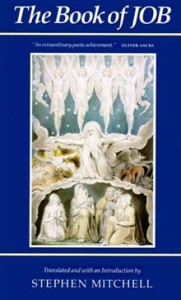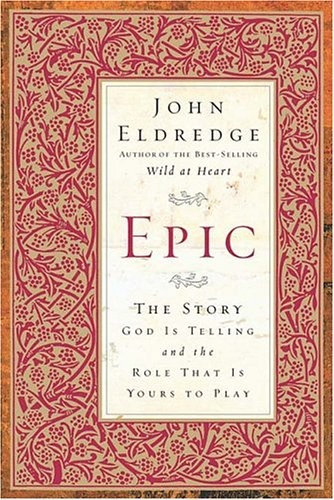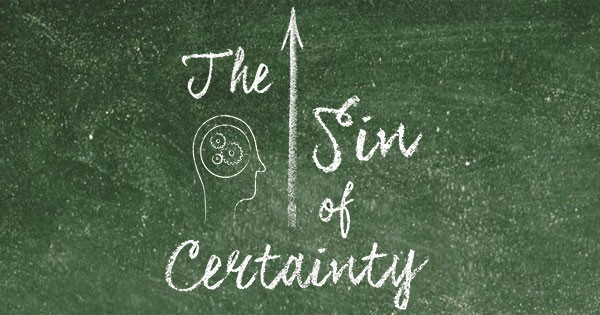Mitchell’s Book of Job
 I bought this book on the strength of the excerpts in Bill McKibben’s Comforting Whirlwind: God, Job and the Scale of Creation. The translation was such a rich, vivid rendering of the poetry that I wanted an extended experience of it.
I bought this book on the strength of the excerpts in Bill McKibben’s Comforting Whirlwind: God, Job and the Scale of Creation. The translation was such a rich, vivid rendering of the poetry that I wanted an extended experience of it.
Turns out that Mitchell’s interpretive introduction was equally rewarding. Mitchell considers the work on literary terms, in the context of similar writings in other faiths and cultures. It seems to me that this gives his approach to the book the daring to confront some things I’d noticed, but that I haven’t seen addressed in commentaries on the book as a theodicy. (Not that I’ve seen many commentaries, so my experience doesn’t say much about the norm.)
For instance, what about the viscerally indignant response I have to God in the opening chapters, where he accepts the challenge from the accuser? Mitchell quotes Carl Jung, suggesting that the God of the opening pages is morally inferior to Job, and seemingly plagued by insecurity. He warns us not to take it too seriously though, since these pages are just a prologue to a tale that never revisits either the accuser or the court of heaven — a court that resembles that of “some ancient King of Kings, complete with annual meetings of the royal council and a Satan.”
And what about the difference between that opening picture of God, and the far more resplendent and terrifying one of the whirlwind later in the book? Mitchell suggests that there are two different realities at work, and the shift from one to the other is signalled by the shift from narrative to poetry. The prologue sketches out the Job of ancient legend, a legend that was probably in existence (says Mitchell) for centuries before this version was written. This is the Job James speaks of in the New Testament when he says, “You have heard of the patience of Job.” It bears little resemblance to the ranting, risking, “ferociously impatient” Job of the poetry. It’s as though the writer lays out the framework of the ancient legend, but then explores it in the entirely different and more searching mode of the poem, returning in the last chapter to the narrative to bring us back to earth.
I’ve said Mitchell’s approach is literary. Under that heading, he seems to approach the text through a mixture of psychoanalytical and archetypal criticism. For instance, he speaks at times in terms of ego and superego, suggesting that at the beginning of the book Job is full of anxiety, and his righteousness is motivated by fear. His “superego is riding high,” in Mitchell’s words. Similarly, different components of the story are viewed as externalized subjective states. The accuser, for instance, is seen as an embodiment of God’s doubts about Job. The whirlwind is seen not as an objective tornado, but a “cloud of unknowing,” a symbol of Job’s release of all he thinks he knows about God. (Elsewhere I’ve read an interpretation of the whirlwind as the bluster of the preceding arguments between Job and company.) Under the category of myth criticism is Mitchell’s reading of the book’s themes and imagery in terms of other myths. For instance, the descriptions given out of the whirlwind of the beast and the serpent Mitchell reads as “central figures in ancient near-eastern eschatology, the embodiments of evil that the sky-god battles and conquers at the end of time, just as he conquered the sea and the forces of chaos in creating the world at the beginning of time.” Another example would be his view of Job as a version of an ancient legend, such as one that existed in Sumer as early as 2000 BC. Beneath these ideas is a notion of a set of common archetypes underlying all myths.
I don’t have a problem with seeing this book in those terms… Its writer may very well have used artistic materials already in existence for a long time, but as scholars with far more authority than I have determined, he uses them in an inspired way to give inspired insight.
I could go on and on about the introduction. (Maybe I have already!) I love the discussion of Job’s friends, of their fear of contact with Job’s suffering, of their awareness that the dogmas they wield like an exoskeleton protect an inner lack of any real depth of understanding or experience. I love the discussion of the ending, and of the way the feminine figures so prominently in the form of Job’s daughters. But the most penetrating discussion has to do with the voice from the whirlwind, and Job’s response. Mitchell suggests that the vision of nature offers a worldview that
stands, of course, in direct opposition to the Genesis myth in which man is given dominion over all creatures. It is a God’s-eye view of creation before man, beyond good and evil, marked by the innocence of a mind that has stepped outside the circle of human values… What the Voice means is that paradise isn’t situated in the past or future, and doesn’t require a world tamed or edited by the moral sense. It is our world, when we perceive it clearly, without eating from the Tree of the Knowledge of Good and Evil.
This vision, Mitchell argues, has a transformational impact on Job. Rejecting the translation of Job’s response as groveling in the dust, he argues that when Job sees this vision, he doesn’t merely capitulate to God’s anger, or submit; he surrenders, and Mitchell’s translation of Job’s response reflects the difference. His discussion of the moral issues involved in his view of God’s response is challenging.
I come to the book with a different worldview and spiritual framework, but I felt that Mitchell gave me fresh insight. He is able to honestly wrestle with the text on its own terms because he has perhaps less of a stake in it; it seems he isn’t out to defend a pre-existing view of God — or at least, his set of pre-existing assumptions is different than mine. This book provides provocative analysis that serves as a good counterpoint to other commentaries, and a translation that seems to scrape all the varnish of the ages off this amazing, explosive poetry. (I should give some examples, but this post is too long already! You can see some excerpts of the poetry, and the intro in entirety, here at Mr. Mitchell’s site, along with reviews by more qualified writers.) Though I’m not ready to agree with the commentary on every point, it’s challenging and confrontational, and it explores aspects of the text that I haven’t seen addressed elsewhere. It’s well worth a read.


